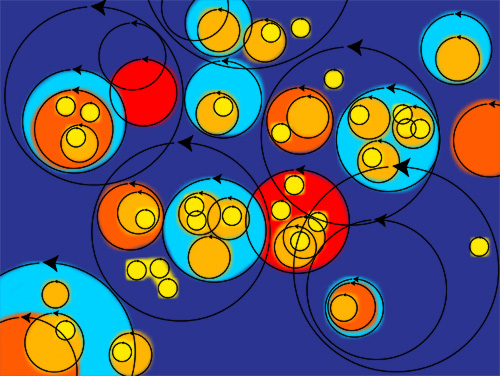
The death of a loved one can send you into a metaphysical tailspin, so to speak. You want so much to believe that you will one day see them again. At the same time, if you’re like me, you want to puzzle it out with reason. But this is a question that is pretty close to the limits.
In my studies at this point, I’ve come across a lot of ideas that are impossible to integrate. One, which I’ve tried to depict in the painting above, is the concept of infinity. Infinity is really something you just have to accept because you can never really get your mind around it. Time, for example, and space, just ARE. There is no before, no after, no inside, no outside, and no cause. Everything else, though, has all those things. Reconcile that one. I’m still trying.
Recently, I saw a number of television shows on time, space, and on Einstein’s theory of relativity. One small bone I have to pick with them. They say Einstein didn’t want to believe that the “universe had a beginning” and so he didn’t accept his own discoveries. Well, to my mind Einstein, and the physicists that came after him, have only proved that the universe is BIGGER than we originally thought, not that it “had a beginning.”
With that aside, on the subject of consciousness, there are a lot of opinions. The study of the subject is unfortunately, like a lot of things, hence the painting above, an infinite loop. There are some things you must accept in order to say anything about consciousness, but you are sometimes later tempted by science to disgard what you had to accept in order to do the science. For example, I’ve heard people say meaningless things like “consciousness is an illusion” which of course makes you ask, who, exactly, is being illuded? To my mind, in order to do any science at all, one has to accept the reality of consciousness, the efficacy of one’s senses, and one’s power to reason. If consciousness were an “illusion” of course, all of science would crumble – and yet it is apparently from science that this idea comes. Oops!
I personally think that Descartes was right when he said that the only thing he could be sure of was his consciousness. His body, he said, might not be real, but the fact that he was thinking meant that he was. I think this is an essential starting point. Wherever and whatever the “you” that you experience is, it’s safe to say that it is. Descartes, in my opinion, took this a little too far and assumed that if his body might not be real, then his mind had to be something distinct. The problem with this is that his body might also be real with his mind being a creation of it.
I have a thought experiment that I haven’t yet seen discussed in the few sources I’ve perused (although I have seen it mentioned in terms of consequences AND on an episode of The Outer Limits!). It is the basic Star Trek transporter thought experiment. I have seen the question asked “Would you be transported by this device?” The answer basically tells you whether you believe there is some ingredient unique to you that will not be reproduced when the transporter “recreates you.” In other words, you are not just a particular arrangement of atoms, but particular atoms at least in some area of your brain. My thought experiment is similar to the Outer Limits episode. Suppose a person is transported and his or her atoms are reassembled identically on the other side, but the original copy is not destroyed. The question is – will these two copies “see” out of each others’ eyes? If you think they won’t, then don’t get into the transporter! The irony is of course, that no one will ever know that “you” have ceased to exist.
But what is this unique element that is required as part of the recipe that creates “you”? I can’t say whether it’s atoms, a particular arrangement of particular molecules of atoms, a quark, an electron, or what. I can’t say whether they are spread out over the brain or are in one place, or if in fact, they are simply a continuity of particular atoms that once a connection is made to other particular atoms are free to be replaced. All I can say is that some element must be unique. Anthony Martino, the other author on this blog, has dubbed this unique element the “consciousness particle”. (Well, he decided to change that to “perceptitron” by I personally still like “consciousness particle”.)
Another interesting thought experiment, but one that fails miserably in my opinion, is one postulated by David Chalmers, a philosopher with a particular interest in consciousness. He claims that being able to conceive of a zombie version of himself – a being that behaves exactly as he does, but does not possess consciousness means that consciousness must be something extra. This doesn’t quite work, because it might be impossible to create a being that behaves exactly the same way without consciousness. In fact, I think it’s better just to accept that it is.
Chalmers had another thought experiment though that I found very interesting. In this one, he postulates what a scientist stuck in a computer simulation, similar to what happened to Neo in the movie The Matrix. To Chalmers, that scientist could do all the science wants, but he will never discover where his “mind” is. That’s because his mind lies outside the system. This gets really interesting when you realize that if our (smaller version of the) universe had a beginning and is expanding, then there must be something outside of it. Spooky.
I’m sure as my studies continue, I’ll have more to say on this topic. I find that this type of discussion can get very emotional, not only because of the psychological aspects – and there are many – but because our language is lacking in concepts to discuss these things. Equivocations are everywhere. The word “consciousness” for example, is itself a huge one. It could mean simple awareness, or it could mean the products of a lifetime of study (what I would call, things you are conscious of.) Then of course, there’s the simple use of the term “I” or “you”. What represents you. Is it the entire content of you mind plus your awareness? Is it that continuity you feel as you learn and grow? Is the “you” of two seconds ago dead? (Not to say anything of the you of 5 years ago?)
I have a lot more questions. What are the basic necessities for a consciousness? I would say at least a rudimentary memory and some sensory input. We have computers that can do this now. Are they conscious? We would say they are not, but we can’t actually know because being conscious does not necessarily mean being able to report that fact.
All of these things may seem kind of futile. But at least some of what you accept here dictates what kind of life you are going to lead. In that respect, it might be worthwhile to pursue. At any rate, right now I have no choice. My mind is in an infinite loop. Hopefully, at some point, I will discover that I have the free-will to hit Ctrl-C.


3 Comments
Julian
9 Jun 2017 - 1:41 pmDescartes was the reason for the fall of philosophy into absolute relativism. Aristotlean Thomism is sound for finding Truth. People just swallow Descartes presupposition without seeing how ridiculous it really is and easily shown to be antithetical to Truth.
http://www.integratedcatholiclife.org/2015/11/dennis-buonafede-origins-of-todays-god-is-dead-morality-descartes/
From Article:
Dr. Wiker continues his analysis on Descartes by writing: “On a deeper level, the snappy dictum ‘I think, therefore I am’ contains one of the most pernicious confusions possible, so destructive that we might very well call it the first sin.”[ii] If we stop to think about it for a second, with just a sliver of common sense, we would recognize that in order to think I would first have to exist, and I keep existing even when I’m not thinking.
The dictum should actually be “I exist, therefore I can think” and so: “…reality exists before our thinking, so that our thinking depends on reality, and this in two ways. First, our thinking depends on the reality of our own existence. If we don’t exist, we can’t think. Second, our thinking correctly depends on our properly conforming our minds to what really exists.”[iii]
http://ndpr.nd.edu/news/62592-descartes-philosophical-revolution-a-reassessment/
Lisa
9 Jun 2017 - 1:42 pmHi Julian, Your arguments sound very “randian”. We’ve actually covered this in the comments of another post, here.